Derna, Libya
Derna (/ˈdɜːrnə/; Arabic: درنة Darnah) is a port city in eastern Libya. With a population of around 85,000[2] to 90,000,[3] Derna was once the seat of one of the wealthiest provinces among the Barbary States. The city is now the administrative capital of Derna District, which covers a much smaller area than the old province. Among Libyan cities, Derna has a unique location and physical environment, as it lies between Jebel Akhdar (also known as Green Mountain), the Mediterranean Sea, and the desert. The city is also home to people of many different backgrounds.
Derna
درنة | |
|---|---|
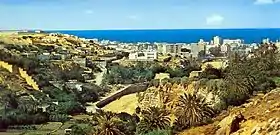 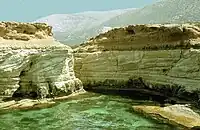   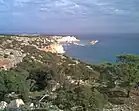 Overview of Derna | |
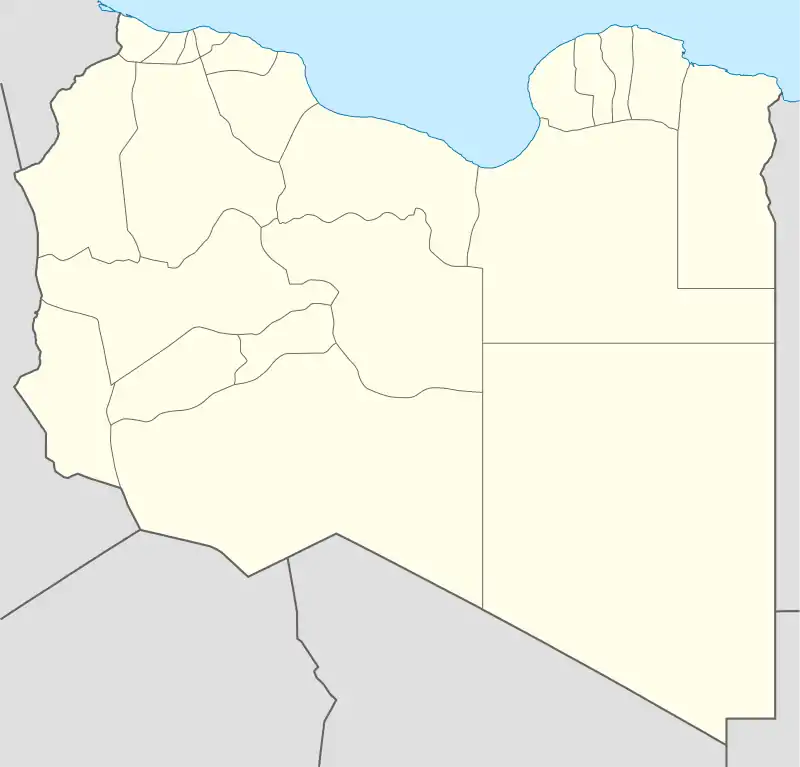 Derna Location in Libya | |
| Coordinates: 32°45′49″N 22°38′10″E | |
| Country | |
| Region | Cyrenaica |
| District | Derna |
| Government | |
| • Mayor | Abdulmenam Al-Ghaithi |
| Population (2011)[1] | |
| • Total | 100,000[2]−150,000[3] |
| Time zone | UTC+2 (EET) |
| License Plate Code | 10 |
The city was the location of the famous Battle of Derna (1805), the first victory achieved by the United States Military on foreign soil. Occurring during the First Barbary War, the battle was fought between a force of roughly 500 US Marines and Mediterranean mercenaries and 4,000 or 5,000 Barbary troops.
Parts of the city were taken over by Islamic State (IS) militants in October 2014.[4] In June 2015, the Shura Council of Mujahideen in Derna defeated IS and took control of the town, before being expelled themselves by the Libyan National Army in the Battle of Derna (2018–2019).
In September 2023, about a quarter of the city was wiped out by a catastrophic flood caused by the collapse of two dams over the Wadi Derna river against the backdrop of Storm Daniel, resulting in the death of thousands of its residents, although the death toll varies by source. Thousands more are either injured and/or missing.[5] Some 10,000 to 20,000[6] others were reported missing.[7][8]
Name
Darnis and Darne were the ancient Greek names for the city.[9] The form Dardanis is sometimes found, although this is erroneous.[10] Under Rome the city was referred to as Darnis and Derna. Under the Arabs, it was known as Derneh (Derne, Dernah) or Terneh (Ternah).
History
Classic era and Middle Ages
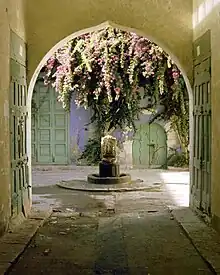
In the Hellenistic period the ancient city of Darnis was part of the Libyan Pentapolis colonized by the Greeks.[9][11] Under Rome, it became a civil and later the religious metropolis of the province of Libya Secunda, or Libya Inferior, that is, the Marmarica region. The names of some of its metropolitan bishops are found in extant documents. Piso was one of the Eastern bishops who withdrew from the Council of Sardica and set up their own council at Philippopolis in 347. Early 5th-century Dioscorus is known because of a dispute he had with the bishop of Erythrum. Daniel took part in the Council of Ephesus in 431. In addition, John Moschus speaks of a bishop Thedodorus of Darnis as having had a vision of Saint Leo the Great in the mid-5th century.[10][12][13]
No longer a residential bishopric, Darnis is today listed by the Catholic Church as a titular see.[14]
The city was resettled by the refugees from Islamic Spain (Expulsion of the Moriscos) in 1493 on the site of the ancient settlement.
Ottoman times
Under Ottoman rule, Derna was initially under the governor at Tripoli, but shortly after 1711, it fell under the Karamanli sultanate until 1835, when it became a dependency of the autonomous sanjak of Benghazi, essentially Cyrenaica, which was governed directly from Constantinople.[15] This in turn, in 1875, became the vilayet of Cyrenaica.[16] In the 1850s, it had an estimated 4,500 inhabitants,[17] who lived by agriculture, fishing and the coastal trade.[10]
The oldest mosque in Derna is Al-masjeed al-ateeq, or the "Old Mosque", restored by wali Mahmoud Karamanli in 1772, vaulted with 42 small cupolas. This kind of vault was in use due to lack of some materials, like timber or stone in the region of Cyrenaica. There is another mosque, named Masjeed az-zawiyah, built in 1846, more strictly curved in the side of a hill.
The French admiral Gantheaume landed at Derna in June 1800 in an attempt to reinforce Napoleon in Egypt by bringing troops overland, but was rebuffed by the local garrison.[18][19]
Derna was the location of the 1805 Battle of Derne, in which forces under U.S. Lieutenant and former Consul to Tripoli William Eaton—who had marched 500 miles (800 km) across the Libyan Desert from Alexandria—captured the city as part of the First Barbary War.
Italian occupation
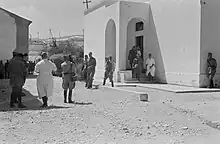
On 16 October 1911, Italian troops occupied Derna during the Italo-Turkish War. The Italian rule over Derna lasted 29 years, 3 months, and 14 days until it was captured on 30 January 1941 by Australian Troops during the Second World War's North African Campaign[20] On 6 April 1941, German forces retook the city from the British, and on 15 November 1942, British forces recaptured it.
Libyan Republic and civil war

In 2007, American troops in Iraq uncovered a list of foreign fighters for the Iraqi insurgency. Of the 112 Libyans on the list, 52 had come from Derna. Derna has the reputation of being the most fundamentalist Muslim city in Libya.[21]
Following mass protests on 18 February 2011, the city came under the control of the National Transitional Council, breaking from the Libyan government.[22][23] The city was never retaken before Gaddafi's ouster from Tripoli and the establishment of a new government. In October 2014, local militants affiliated with the Islamic Youth Shura Council publicly pledged allegiance to Abu Bakr al-Baghdadi, the leader of the Islamic State.[24] In November 2014, al-Baghdadi released an audio-recording accepting the pledge of allegiance and announced the expansion of his group.[25] On June 28, 2018, forces loyal to Khalifa Haftar claimed to have taken full control of the city, following a two-year siege of the city that culminated in a month-long battle.[26]
Storm Daniel
On 10 September 2023, Storm Daniel made landfall in Libya near Benghazi. While moving east-southeast, the storm caused torrential rainfall and extreme flooding in Derna, prompting the government to declare a state of emergency for the area,[27][28] after collapses in the early morning of the next day of the Derna dam and the Mansour dam,[29] which caused floodwaters to inundate the areas of the city around the Wadi Derna.[30][31] At least 3,252 people were confirmed dead,[32] with more than 11,300 casualties were initially estimated.[33][34] Meanwhile, a government minister said that 25% of Derna had "disappeared",[35] with large parts of the city washed out to sea.[36]
Geography
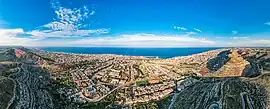
Derna is located at the eastern end of the Jebel Akhdar, one of the very few forested areas in Libya; due to its arid climate, forest makes up a mere 0.1% of Libya's land area. However, Derna is near the fertile upland area of eastern Libya, which is the wettest region in the country, receiving some 600 millimetres (24 in) of precipitation annually.
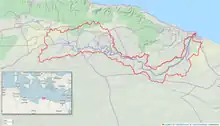
The city is built along the Wadi Derna, an ephemeral river that is dry much of the year. Historically, the city has been repeatedly damaged by floods.[37] The Abu Mansur and Derna dams upstream of the city were meant to control soil erosion and prevent flooding.[38] Both dams were destroyed by high flow following Mediterranean Storm Daniel in September 2023. The dambreaks appear to have contributed significantly to flood damage and fatalities in Derna.[39]
Derna is linked with Shahhat by two roads; the inner one running through Al Qubah is part of the Libyan Coastal Highway and the coastal one running through Susa and Ras al Helal.
Climate
Derna features a hot semi-arid climate (Köppen BSh) with strong Mediterranean influences: essentially all the modest annual rains fall between October and March. The annual rainfall is around 275 millimetres or 11 inches. Its maritime location allows it to have an extreme seasonal lag that is incredibly uncommon for a dry climate. However, the influence of the Sahara allows for the extreme record highs to occur months before the average warmest months.
In winter, the city's average temperature ranges between 9 and 20 °C (48.2 and 68.0 °F). Summers are quite long and effectively rainless with afternoon temperatures averaging well above 27 °C or 80.6 °F between June and October.
| Climate data for Derna, Libya | |||||||||||||
|---|---|---|---|---|---|---|---|---|---|---|---|---|---|
| Month | Jan | Feb | Mar | Apr | May | Jun | Jul | Aug | Sep | Oct | Nov | Dec | Year |
| Record high °C (°F) | 29.6 (85.3) |
32.8 (91.0) |
35.8 (96.4) |
38.3 (100.9) |
44.0 (111.2) |
44.8 (112.6) |
41.7 (107.1) |
43.5 (110.3) |
40.6 (105.1) |
39.0 (102.2) |
37.8 (100.0) |
30.6 (87.1) |
44.8 (112.6) |
| Average high °C (°F) | 17.5 (63.5) |
18.2 (64.8) |
19.4 (66.9) |
21.7 (71.1) |
24.3 (75.7) |
27.3 (81.1) |
28.2 (82.8) |
29.1 (84.4) |
28.1 (82.6) |
26.1 (79.0) |
23.1 (73.6) |
19.2 (66.6) |
23.5 (74.3) |
| Daily mean °C (°F) | 14.1 (57.4) |
14.5 (58.1) |
15.6 (60.1) |
17.7 (63.9) |
20.3 (68.5) |
23.5 (74.3) |
25.3 (77.5) |
26.1 (79.0) |
25.0 (77.0) |
22.4 (72.3) |
19.3 (66.7) |
15.7 (60.3) |
20.0 (68.0) |
| Average low °C (°F) | 10.7 (51.3) |
10.8 (51.4) |
11.7 (53.1) |
13.8 (56.8) |
16.2 (61.2) |
19.7 (67.5) |
22.3 (72.1) |
23.2 (73.8) |
21.9 (71.4) |
18.6 (65.5) |
15.5 (59.9) |
12.2 (54.0) |
16.4 (61.5) |
| Record low °C (°F) | 4.4 (39.9) |
4.4 (39.9) |
5.0 (41.0) |
6.7 (44.1) |
8.7 (47.7) |
8.3 (46.9) |
10.0 (50.0) |
18.3 (64.9) |
14.5 (58.1) |
10.0 (50.0) |
8.3 (46.9) |
6.7 (44.1) |
4.4 (39.9) |
| Average rainfall mm (inches) | 60 (2.4) |
39 (1.5) |
28 (1.1) |
10 (0.4) |
6 (0.2) |
2 (0.1) |
0 (0) |
0 (0) |
4 (0.2) |
32 (1.3) |
36 (1.4) |
57 (2.2) |
274 (10.8) |
| Average rainy days (≥ 0.1 mm) | 11 | 8 | 7 | 3 | 2 | 0 | 0 | 0 | 1 | 5 | 6 | 5 | 48 |
| Average relative humidity (%) | 76 | 72 | 74 | 74 | 74 | 75 | 80 | 80 | 75 | 74 | 75 | 78 | 76 |
| Mean monthly sunshine hours | 151.9 | 189.3 | 204.6 | 231.0 | 282.1 | 297.0 | 316.2 | 297.6 | 237.0 | 223.2 | 189.0 | 145.7 | 2,764.6 |
| Mean daily sunshine hours | 4.9 | 6.7 | 6.6 | 7.7 | 9.1 | 9.9 | 10.2 | 9.6 | 7.9 | 7.2 | 6.3 | 4.7 | 7.7 |
| Source 1: Deutscher Wetterdienst[40] | |||||||||||||
| Source 2: Arab Meteorology Book (sun only)[41] | |||||||||||||
Politics
The entire city council of Derna were dismissed after the flooding.[42]
Description
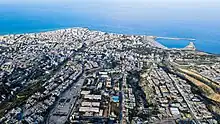
Derna has three main squares. The most popular square is the Maydan Assahabah. This square was always used for mass demonstrations against Libyan leader Muammar Gaddafi. The city is also a tourist hub due to its old city (the Medina), which is home to Islamic architecture. The Medina consists of a mosque, church, synagogue, many small streets, and old souqs. Derna's neighborhoods include Downtown (Wast Il Blaad), Al Ikweih, Al Mighar, Assahel Ashargi, Al Wadi, Bab Tobruq, Al Fitayih, and Bab Shaiha.
Main sights
There are many places of tourist interest, such as the Old Medina, Dark Souq, Sahaba Mosque, Attiq Mosque (42 Domes), Zuhair ibn Qa'is Mausoleum, al Kharraza, Souq al Farda and Khidra, Piazza Hamra, Piazza Derna, Maydan Al Sahhaba, Jewish Synagogue, Byzantine Church, Catholic Church, Ras Tin Beach, Piazza Attair, Ibrahim Istaa Omar, Derna Valley, Derna Waterfall, Finar Avenue, Zangat Al Bahr (Bahr Street), Omar Faiek Shennib Street, Zangat Al Hmar (Hmar Street).
See also
References
- "Der Spiegel". 2011-08-23. Archived from the original on 2014-10-06.
- Cruickshank, Paul; Robertson, Nic; Lister, Tim; Karadsheh, Jomana (18 November 2014). "ISIS comes to Libya". CNN. Archived from the original on 23 November 2014. Retrieved 4 July 2015.
- ".:Middle East Online:::". Archived from the original on 5 July 2015. Retrieved 4 July 2015.
- "The Islamic State of Libya Isn't Much of a State". Foreign Policy. 9 April 2015. Archived from the original on 9 June 2015. Retrieved 23 February 2015.(subscription required)
- "Death toll hits 11,300 in Libyan city destroyed by floods". NBC News. 2023-09-14. Archived from the original on 2023-09-14. Retrieved 2023-09-15.
- العربية (2023-09-14). "حصيلة مرعبة لضحايا فيضانات ليبيا.. 11 ألف قتيل و20 ألف مفقود". العربية (in Arabic). Al Arabiya. Archived from the original on 2023-09-20. Retrieved 2023-09-15.
- "Bodies wash ashore in Libya as devastated city races to count its dead". NBC News. 2023-09-13. Archived from the original on 2023-09-14. Retrieved 2023-09-14.
- "Massive flooding in Eastern Libya kills over 8,000 people". Mehr News Agency. 2023-09-14. Archived from the original on 2023-09-15. Retrieved 2023-09-14.
- Ptolemy (IV, 4, 2; 5; 6)
-
 Herbermann, Charles, ed. (1913). "Darnis". Catholic Encyclopedia. New York: Robert Appleton Company.
Herbermann, Charles, ed. (1913). "Darnis". Catholic Encyclopedia. New York: Robert Appleton Company. - Ammianus Marcellinus, (XXII, 16, 4)
- Michel Lequien, Oriens christianus in quatuor Patriarchatus digestus Archived 2016-01-03 at the Wayback Machine, Paris 1740, Vol. II, coll. 631-632
- Raymond Janin, v. Darni in Dictionnaire d'Histoire et de Géographie ecclésiastiques Archived 2020-04-10 at the Wayback Machine, vol. XIV, Paris 1960, col. 89
- Annuario Pontificio 2013 (Libreria Editrice Vaticana 2013 ISBN 978-88-209-9070-1), p. 879
- Vailhé, S. (1913) "Tripoli, Prefecture Apostolic of" Catholic Encyclopedia volume 15, page 59 Archived 2014-01-02 at the Wayback Machine
- Hayes, Carlton Joseph Huntley (1919) A political and social history of modern Europe, Volume 1 Macmillan, New York, page 514 Archived 2014-01-02 at the Wayback Machine, OCLC 19118611
- Hamilton, James (1856) Wanderings in North Africa J. Murray, London, page 117 Archived 2015-01-17 at the Wayback Machine, OCLC 5659586
- Mackesy, Piers (1995) British victory in Egypt, 1801: the end of Napoleon's conquest Routledge, London, page 162 Archived 2014-01-02 at the Wayback Machine, ISBN 0-415-04064-7
- Strathern, Paul (2008) Napoleon in Egypt Bantam Books, New York, page 418 Archived 2014-01-02 at the Wayback Machine, ISBN 978-0-553-80678-6
- "Derna". Archived from the original on 18 January 2015. Retrieved 4 July 2015.
- Destination: Martyrdom Archived 2010-01-24 at the Wayback Machine Newsweek, April 28, 2008.
- "Gaddafi defiant as state teeters". Archived from the original on 19 March 2011. Retrieved 4 July 2015.
- "Gaddafi ordered Lockerbie bombing: Ex-minister". 23 February 2011. Archived from the original on 2011-02-26. Retrieved 2011-02-23.
- "How a Libyan city joined the Islamic State group". The Big Story. Archived from the original on 28 January 2015. Retrieved 25 March 2015.
- "The Islamic State's Archipelago of Provinces". Washington Institute for Near East Policy. 14 November 2014. Archived from the original on 22 December 2014. Retrieved 17 November 2014.
- "Haftar's forces say they have captured Libyan city of Derna". Reuters. 2018-06-28. Archived from the original on 2018-06-28. Retrieved 2018-06-28.
- Wintour, Patrick (2023-09-11). "Up to 2,000 feared drowned after Libyan city hit by 'catastrophic' storm floods". The Guardian. ISSN 0261-3077. Archived from the original on 2023-09-11. Retrieved 2023-09-11.
- Abdusamee, Mohammed; Kwai, Isabella (2023-09-11). "Hundreds Reported Dead in Severe Libya Flooding". The New York Times. ISSN 0362-4331. Archived from the original on 2023-09-11. Retrieved 2023-09-11.
- "CCTV shows cars swept away in Libya flooding". BBC News. Archived from the original on 16 September 2023. Retrieved 2023-09-15.
- "Thousands feared dead in Libya after dam collapse". NBC News. 2023-09-11. Archived from the original on 2023-09-12. Retrieved 2023-09-11.
- "Libyan floods: Derna city alone recovers 1,000 bodies – minister". BBC. 12 September 2023. Archived from the original on 12 September 2023. Retrieved 12 September 2023.
- "A week after deadly Libya floods, aid effort gathers pace". Aljazeera. 17 September 2023. Archived from the original on 18 September 2023. Retrieved 18 September 2023.
- "Bodies wash ashore in Libya as devastated city races to count its dead". NBC News. 2023-09-13. Archived from the original on 2023-09-14. Retrieved 2023-09-14.
- "Libya floods: Death toll rises to 11,300 in Derna, severely decomposing bodies found in the sea". CNN. 16 September 2023. Archived from the original on 17 September 2023. Retrieved 17 September 2023.
- "Libyan floods: Derna city alone recovers 1,000 bodies – minister". BBC. 12 September 2023. Archived from the original on 12 September 2023. Retrieved 12 September 2023.
- "Libyan floods: Derna city looks like a tsunami hit it - minister". BBC. 2023-09-12. Archived from the original on 2023-09-12. Retrieved 2023-09-12.
- Abu-Aziza, Fatma B; Yacoub M El-Barasi; Rebeh O Rahil (2018). "Flora, Vegetation and Human Activities of Wadi Derna-El-JabalFlora, Vegetation and Human Activities of Wadi Derna-El-Jabal El-Akhadar-Libya". ContROL. doi:10.13140/RG.2.2.27645.26086. Retrieved 2023-09-12.
- Arsel Insaat. "DERNA AND BU MANSUR DAMS REHABILITATION PROJECT (2012)".Archived 2023-09-14 at the Wayback Machine
- Clayton, Chris; Mike Hills; Paul Sargeant; Tural Ahmedzade; Kady Wardell; Gerry Fletcher; Filipa Silverio; Erwan Rivault (2023-09-13). "Libya floods: Why damage to Derna was so catastrophic". BBC News. Archived from the original on 2023-09-13. Retrieved 2023-09-14.
- "Klimatafel von Derna / Libyen" (PDF). Baseline climate means (1961-1990) from stations all over the world (in German). Deutscher Wetterdienst. Archived (PDF) from the original on 27 March 2019. Retrieved 27 March 2016.
- "Appendix I: Meteorological Data" (PDF). Springer. Archived (PDF) from the original on 4 March 2016. Retrieved 27 March 2016.
- "Libya flood: Derna mayor's house burnt down in protests". BBC News. 2023-09-19. Archived from the original on 2023-09-19. Retrieved 2023-09-20.
External links
![]() Media related to Derna at Wikimedia Commons
Media related to Derna at Wikimedia Commons

.svg.png.webp)